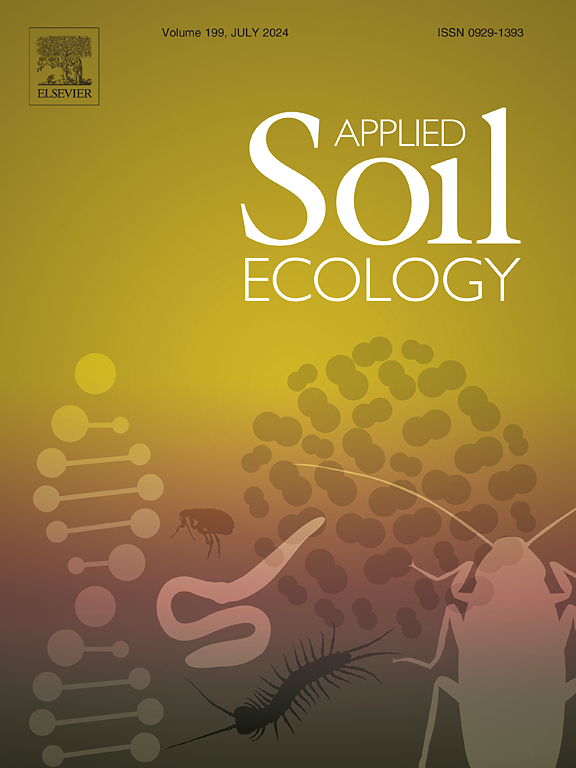Organic management improves soil multifunctionality by enhancing soil quality and enriching key microbes in tea plantation
IF 5
2区 农林科学
Q1 SOIL SCIENCE
引用次数: 0
Abstract
Intensive fertilization leads to soil acidification and nutrient imbalance in tea plantations. Organic management can improve soil structure, promote soil microbial activity and metabolism, and conducive to sustainable development of tea cultivation. However, our understanding of how long-term organic management affects soil quality index (SQI), soil multifunctionality (SMF), and microbial composition in tea plantations at different soil layers remains limited. Here, the enzyme activities, microbial communities, SQI and SMF in the topsoil (0–20 cm) and subsoil (20–40 cm) of tea plantations with conventional (CM) and organic (OM) managements for 20 years history were investigated. Results showed that compared to CM, OM significantly increased soil total nutrients, available nutrients, and enzyme activities (especially in the topsoil) in three tea plantations. In addition, OM increased SQI and SMF by 14.0 %–41.3 % and 143.6 %–262.9 % in the topsoil and 12.2 %–22.2 % and 37.2 %–63.2 % in the subsoil, respectively. OM significantly increased relative abundance of key bacteria and fungi involved in nutrient cycling, including Sphingomonas, Pseudomonas, Devosia, Nocardioides and Oidiodendron. Structural equation model analysis found that OM improved SMF by driving key bacteria and fungi species induced by higher total and available nutrients and enhancing SQI in the topsoil, while improved SMF only by driving key bacteria species and enhancing SQI in the subsoil. Overall, our results highlight that organic management can improve SMF by enhancing SQI and enriching key microbial species in tea plantation soils, and these findings provide new perspective for adjustment of agricultural managements in tea plantation.

有机管理通过提高茶园土壤质量和丰富关键微生物来提高土壤的多功能性
集约施肥导致茶园土壤酸化和养分失衡。有机管理可以改善土壤结构,促进土壤微生物活性和代谢,有利于茶叶种植的可持续发展。然而,我们对长期有机管理如何影响茶园土壤质量指数(SQI)、土壤多功能性(SMF)和微生物组成的了解仍然有限。研究了20年来传统管理和有机管理茶园表层土壤(0 ~ 20 cm)和下层土壤(20 ~ 40 cm)的酶活性、微生物群落、SQI和SMF。结果表明,与CM相比,OM显著提高了3个茶园土壤全养分、速效养分和酶活性(尤其是表土)。有机质对表层土壤SQI和SMF的影响分别为14.0% ~ 41.3%和143.6% ~ 262.9%,对底土SQI和SMF的影响分别为12.2% ~ 22.2%和37.2% ~ 63.2%。OM显著提高了参与养分循环的关键细菌和真菌的相对丰度,包括鞘单胞菌、假单胞菌、Devosia、Nocardioides和oididendron。结构方程模型分析发现,OM通过提高总养分和速效养分诱导的关键细菌和真菌种类,提高表层土壤SQI来改善SMF,而仅通过驱动关键细菌种类,提高底土SQI来改善SMF。综上所述,有机管理可以通过提高茶园土壤SQI和丰富茶园土壤中关键微生物种类来改善茶园土壤的SMF,这为茶园农业管理的调整提供了新的视角。
本文章由计算机程序翻译,如有差异,请以英文原文为准。
求助全文
约1分钟内获得全文
求助全文
来源期刊

Applied Soil Ecology
农林科学-土壤科学
CiteScore
9.70
自引率
4.20%
发文量
363
审稿时长
5.3 months
期刊介绍:
Applied Soil Ecology addresses the role of soil organisms and their interactions in relation to: sustainability and productivity, nutrient cycling and other soil processes, the maintenance of soil functions, the impact of human activities on soil ecosystems and bio(techno)logical control of soil-inhabiting pests, diseases and weeds.
 求助内容:
求助内容: 应助结果提醒方式:
应助结果提醒方式:


